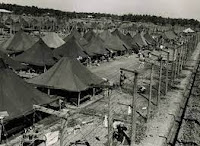Wartime Wednesday: POW Camps in America
 |
| Photo: Public Domain |
The first full-scale POW camps in the US opened on February 1, 1943, in Crossville, Tennessee, Hereford and Mexia, Texas, Ruston, Louisiana, and Weingarten, Missouri. By the end of the war, there would be 511 area camps and approximately 175 smaller, branch camps in forty-six of the forty-eight states (Hawai’i was still a territory at this point). Most of the camps were located in the South and Southwest regions of the country because of the higher expense of heating barracks in colder areas. Total POW population at its peak was 371,683 Germans, 50,273 Italians, and 3,915 Japanese.
Frankly unprepared for basic logistical considerations such as food, clothing, and housing of POWs, the US was reluctant to accept Britain’s prisoners. Additionally, the military had only a brief experience with a limited POW population during WWI. Another consideration was that the presence of Germans on US soil would create a security problem and raise fear among civilians. As a result, coverage of the camps by newspapers was limited until the end of the war.
Liberty ships were used to transport the prisons to the US, and as many as 30,000 arrived in New York
 |
| Photo: Public Domain |
The Geneva Convention of 1929 had its own requirements that mandated prisoner living quarters be comparable to those of its own military, 40 sf for enlisted men and 120 sf for officers. Equal treatment was also required which meant they were paid American military wages. They were paid in scrip as money could be used during escape attempts.
 |
| Photo: Public Domain |
__________________________
Francine’s Foibles
She's given up hope. He never had any. Will they find it together?
World War II is finally over, and America is extra grateful as the country approaches this year’s Thanksgiving. But for Francine life hasn’t changed. Despite working at Fort Meade processing the paperwork for the thousands of men who have returned home, she’s still lonely and very single. Is she destined for spinsterhood?
Grateful that his parents anglicized the family surname after emigrating to the United States after the Great War, first-generation German-American Ray Fisher has done all he can to hide his heritage. He managed to make it through this second “war to end all wars,” but what American woman would want to marry into a German family. Must he leave the country to find wedded bliss?


No comments:
Post a Comment